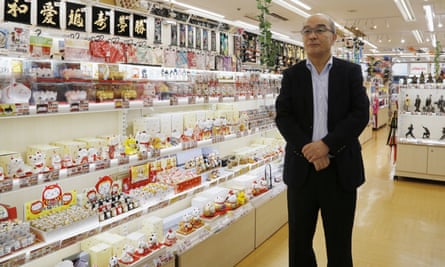Japan has absolutely opened its doorways to guests after greater than two years of pandemic isolation.
On Tuesday, the nation reinstated visa-free journey to dozens of nations, ending a few of world’s strictest Covid-19 border controls. Japan has additionally lifted the 50,000-person entry cap and ended the requirement for vacationers to journey as a part of tour teams, Kyodo information company reported.
Prime minister Fumio Kishida is relying on tourism to assist invigorate the financial system and reap some advantages from the yen’s slide to a 24-year low – however hopes for a tourism growth face robust headwinds: a scarcity of hospitality employees, lingering pandemic issues, and predictions from economists that vacationer returns can be gradual.
Kishida stated final week the federal government is aiming to draw 5tn yen ($34.5bn) in annual vacationer spending. That purpose could also be too bold for a sector that has withered in the course of the pandemic.
Spending from abroad guests will attain solely 2.1tn yen by 2023 and gained’t exceed pre-Covid ranges till 2025, economist Takahide Kiuchi wrote in a Nomura Analysis Institute report.
Since June, Japan has allowed vacationers to go to in teams accompanied by guides, a requirement that was additional relaxed to incorporate self-guided package deal excursions.
Simply over half one million guests have come to Japan to date in 2022, in contrast with a document 31.8 million in 2019.
Arata Sawa is amongst these longing for the return of overseas guests, who beforehand comprised as much as 90% of the company at his conventional inn.
“I’m hoping and anticipating that a whole lot of foreigners will come to Japan, identical to earlier than Covid,” stated Sawa, the third-generation proprietor of the Sawanoya ryokan in Tokyo.
Flag provider Japan Airways Co has seen inbound bookings triple because the border easing announcement, president Yuji Akasaka instructed Nikkei newspaper final week – however worldwide journey demand gained’t absolutely get well till round 2025.
“I don’t assume there’s going to be a sudden return to the pre-pandemic scenario,” stated Sawato Shindo, president of Amina Assortment Co, a 120-shop reward and memento chain.
Hopes for tourism’s roaring return are additionally tempered by a scarcity of employees. Nearly 73% of lodges nationwide stated they had been wanting common employees in August, up from about 27% a yr earlier, in accordance with market analysis agency Teikoku Databank.
Akihisa Inaba, common supervisor on the hot-spring resort Yokikan in Shizuoka, central Japan, who stated brief staffing in the course of the summer season meant employees needed to forego time without work.
“Naturally, the labour scarcity will develop into extra pronounced when inbound journey returns,” stated Inaba. “So, I’m not so certain we will be overjoyed.”
Whether or not abroad guests will put on face masks and abide by different widespread an infection controls in Japan is one other concern. The strict border controls had been broadly in style throughout a lot of the pandemic, and fears stay in regards to the look of recent viral variants.
On Friday the federal government permitted altering resort laws in order that operators can refuse company who don’t obey an infection controls throughout an outbreak.
“From the beginning of the pandemic till now, we’ve had only a few overseas company,” stated Tokyo innkeeper Sawa. “Just about all of them wore masks, however I’m actually undecided whether or not the individuals who go to from right here on will do the identical.”

One power that will buoy the return of holiday makers is the drop of the yen: the yen has weakened sharply in opposition to the greenback, giving some guests a lot heftier shopping for energy and making Japan enticing to discount hunters concentrating on Japan’s electronics, luxurious items and retail districts.
In Tokyo’s Akihabara electronics district, Hideyuki Abe’s cabinets crammed with watches and souvenirs like samurai swords and toy cats with bobbing heads. Abe employs about 50 folks and had resorted to layoffs after the pandemic struck in 2020. Some Akihabara outlets have closed down since then, however he bided his time.
“Hanging on is the place energy lies,” Abe stated. “Now, I’m a bit anxious a couple of scarcity of employees.”
With pandemic restrictions waning and the greenback at a three-decade excessive of about 145 yen, he believes the vacationers will probably be again.
“This time,” he says, “it’s an ideal alternative.”
Reuters and Related Press contributed to this report






